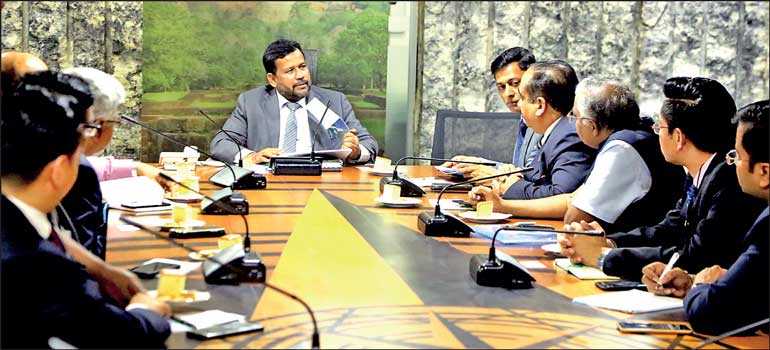Thursday Feb 19, 2026
Thursday Feb 19, 2026
Friday, 20 September 2019 00:00 - - {{hitsCtrl.values.hits}}

Indian industrial investors are preparing for major investment moves in Sri Lankan projects – not only on mega-infrastructure ventures but even on smaller outlays. India’s powerful Confederation of Indian Industry (CII) has, for the first time, expressed its new investment and funding push on Sri Lankan infrastructure projects on 17 September.
“Sri Lanka is becoming a preferred destination for Indian investors due to its similar climate and close proximity to India. We are also keen on showcasing Indian expertise in Sri Lanka through large scale projects,” said Mohan Mutha Exports Ltd. Chennai Director Praful Kumar Mutha who was leading a Confederation of Indian Industry (CII)’s 10-member business delegation to Sri Lanka.
Director Praful Kumar was meeting the Minister of Industry, Commerce, Resettlement of Protracted Displaced Persons, Cooperative Development, Skills Development and Vocational Training (ICTPDPCDSDVT) Rishad Bathiudeen on 17 September joined by the members of his delegation to Colombo. The industry-led and industry-managed CII is India’s second largest industry chamber with more than 9,100 direct and over 300,000 indirect membership of firms from 291 various national and regional bodies (private and public sectors, SMEs to multi nationals). CII is no stranger to Sri Lanka and its previous teams visiting Colombo met Minister Bathiudeen on several occasions.
“We are interested in securing large scale projects in Sri Lanka such as refineries, IT parks, desalinisation plants, pharmaceutical zones, container terminals and vocational training facilities. Many mechanisms are available in India for funding of such large projects overseas. We at CII can be a facilitator for such project funding in Sri Lanka as well. We can move in with funding from Indian Exim Bank. The Buyers’ Credit (BC) project funding mechanism of Indian Exim Bank is one such way,” said Kumar.
“Such funds are for Indian exporters entering into new foreign markets where deferred credit on medium or long term basis is more practical. Interest rates are also very low at LIBOR plus 1.25% (annual) for eight years! We are not talking about funding that comes through the usual Line of Credit Agreement through which such projects as upgrading Sri Lankan railways have been taking place. In Buyers’ Credit, project execution is done by an Indian firm called the project exporter.
“Even though the fund recipient is an Indian company, the firms in the target country too benefit immensely. 75% of the material for the project needs to come from the Indian firm, but Sri Lankan contractors can supply the labour – and also the 25% materials in the BC project. Any kind of project can be done on BC funds in Sri Lanka. Usually the Indian Firm’s foreign partner is the government of that country or a government owned institution. Even an independent local partner is allowed.
“However, if such local project partner is not part of the government of Sri Lanka, then India Exim bank requires a sovereign guarantee from the Lankan government on behalf of the independent party. Therefore these projects are not India-SL joint ventures but 100% Indian company owned projects. The benefit of this is that there is no limit for the dollar value of the project-it could be a low $ 1 million or high $ 500 million – or much more. The $ 398 million project commenced in Ghana recently under BC by the Indian Exim bank and the project on a new road in Maldives at $ 20 million are examples.
Average project length is three years and it takes about three to six months for initial background work. High-value projects such as ports, bridges, highways, and IT parks are a good match for BC projects. Even though revenue generating projects are preferred for most BC projects, even a social non-profit projects without revenues, too are possible. We can facilitate top Indian multinationals such as Reliance, Wipro, Tata, Aditya Birla, etc. to Sri Lanka in this if the projects are large scale,” he added.
Meanwhile, since March 2018, Sri Lanka has been placed in the Positive List of Countries for Buyer’s Credit under India’s National Export Insurance Account (NEIA) by India’s Export Credit Guarantee Corporation (ECGC). 80 countries have been graded in this list. Sri Lanka earned a place in the ‘Second positive group’ (called A2) out of seven grades (other grades are A1, B1, B2, C1, C2 and D). The A2 ranking (out of all the seven) is an attractive positioning for Indian investors eager to enter Sri Lanka.
Minister Bathiudeen welcomed CII’s interest to take on large projects in Sri Lanka, and said: “The presence of Indian companies in Sri Lanka have been longstanding. India is the fourth largest FDI provider to Sri Lanka in 2005-2017. The Unity government welcomes Indian FDI to Sri Lanka and on behalf of it I and my Ministry extend our fullest support to investors from India including CII members. Just as Indian investors are entering Sri Lanka, more and more Lankan firms too are investing in India.”
India is one of 28 countries that Sri Lanka has signed a Bilateral Investment Promotion and Protection Treaty with. According to Sri Lanka Board of Investment, India is the fourth largest FDI provider to Sri Lanka in 2005-2017 followed by China, Malaysia and Hon Kong. The cumulative Indian investment in Sri Lanka in 2005-2017 totalled $ 1.16 billion. The main investment sectors that Indian FDIs in are tourism and hotels, petroleum-retail, manufacturing, real estate, telecommunication, banking and financial services.
Among investments by Sri Lankan companies in India are apparel (Brandix, MAS holdings), furniture (Damro), energy (LTL Holdings), and in freight servicing and logistics (DRH Logistics and Freight Links International).
On 17 September, Minister Bathiudeen also instructed his officials to promptly coordinate on CII’s future inquiries on possible projects under his Ministry and under other government offices.